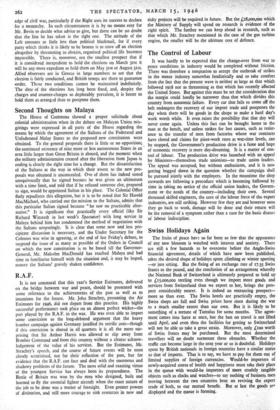The Control of Labour
It was hardly to be expected that the change-over from war to peace conditions in industry would be completed without friction. There was therefore a temptation to accept the outbreak of strikes in the motor industry somewhat fatalistically and to take comfort from the fact that the present wave is neither as large as that which followed 1918 nor as threatening as that which has recently affected the United States. But against this must be set the consideration that the margin could hardly be narrower than that which divides this country from economic failure. Every car that fails to come off the belt endangers the recovery of our import trade and postpones the day when there will be goods in the shops to make a hard day's work worth while. It even raises the possibility that that day will never come again. Unless this fact can be brought home to the man at the bench, and unless strikes for lost causes, such as resist- ance to the transfer of men from factories whose war contracts have closed and claims for piece-work rates at war-time levels, can be stopped, the Government's production drive is a farce and hope of economic recovery is mere day-dreaming. It is a matter of con- trol of labour. The production drive was launched with an appeal by Ministers—themselves trade unionists—to trade union leaders. The appeal was accepted, but without enthusiasm, and it is now getting bogged down in the question whether the campaign shall be pursued jointly with the employers. In the meantime the shop stewards are following a procedure which is becoming hallowed by time in taking no notice of the official union leaders, the Govern- ment or the needs of the country—including their own. Several thousand skilled engineers, the core of the labour force of the export industries, are still striking. However few they are and however soon they go back to work, damage will be done and their return will be the removal of a symptom rather than a cure for the basic disease of labour indiscipline.


























 Previous page
Previous page